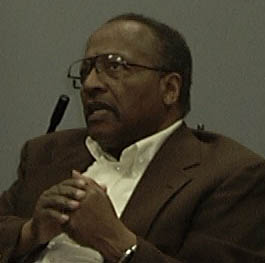WALTER McDUFFY
 |
|
SAMPLES FROM THE INTERVIEW ON HIS CHILDHOOD: "usually I went and gathered wood for a wood stove that we had, and usually we went to different stores that had wooden crates and that sort of thing and threw them out. And mostly this was in the white neighborhood that was close by. And I remember a young boy there, saying—I had my wagon with wood and crates and this kind of thing—and he asked me what it was for and I said, “The stove fire at home.” And he says, “Oh, you’re poor aren’t you,” and I said, “No, I’m not poor!” And that was a fascinating thing about it—yes we were poor, but somehow we didn’t think of ourselves as being poor." ON THE WORK THAT REMAINS: "I guess my hopes or dreams would be that we might function as a community in which we can accept people—the differences that we find in people—and see that as a positive thing, and something that we need to accept and celebrate, rather than something that is threatening to us, and to our wellbeing. And I think this is what happens to a community, and especially one like here in Fargo-Moorhead, which, when I came was 99.9%, almost, Caucasian, and at least now is about 95%. (laughs) You have a community that is very monolithic."
|